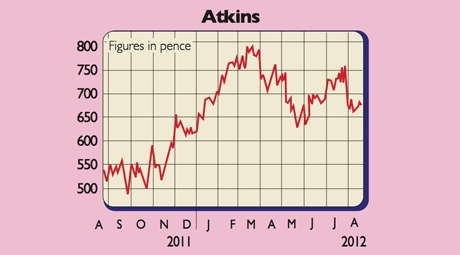Get the latest financial news, insights and expert analysis from our award-winning MoneyWeek team, to help you understand what really matters when it comes to your finances.
You are now subscribed
Your newsletter sign-up was successful
Want to add more newsletters?

Twice daily
MoneyWeek
Get the latest financial news, insights and expert analysis from our award-winning MoneyWeek team, to help you understand what really matters when it comes to your finances.

Four times a week
Look After My Bills
Sign up to our free money-saving newsletter, filled with the latest news and expert advice to help you find the best tips and deals for managing your bills. Start saving today!
Last month, the British government said it would underwrite up to £40bn of new investment in infrastructure to kick-start the economy. Another £9bn was promised for electrification of the railways, and a further £22bn to upgrade the dilapidated energy network. Altogether, this represents a potential £71bn windfall for the infrastructure industry.
One company well placed to benefit is WS Atkins. As Britain's largest engineering design consultancy, the group employs more than 17,000 staff. Britain accounts for 46% of revenues and North America a further 24%, with the Middle East and Asia making up most of the rest. Around half of sales are made to the public sector, with the rest coming from commercial/regulated industries. The firm's major operating sectors include rail, highways, utilities/power (including nuclear), defence, aerospace and education.
This diversity, plus a wide geographical footprint, makes it pretty resilient during harsh economic times. However, in August the company said it suffered contract delays in the Middle East and a volume shortfall in America due to disruption caused by the presidential election. Performance for the year will be slightly below most analysts' expectations.
MoneyWeek
Subscribe to MoneyWeek today and get your first six magazine issues absolutely FREE

Sign up to Money Morning
Don't miss the latest investment and personal finances news, market analysis, plus money-saving tips with our free twice-daily newsletter
Don't miss the latest investment and personal finances news, market analysis, plus money-saving tips with our free twice-daily newsletter
On the plus side, the British arm recently bagged a £64m contract with Network Rail in the Cardiff area. Elsewhere, the AsiaPacific and European divisions have won nice contracts, including projects linked to the third runway for the Hong Kong airport authority and the Liding tram line in Sweden. The firm's highly acclaimed work on the London Olympic Stadium, Velodrome and Aquatics Centre also showcased its engineering skills on the international stage.
The Middle East now offers some big opportunities. Atkins has gone from single projects, such as the Burj al-Arab hotel in Dubai, to being awarded a contract to set up a central planning office to co-ordinate infrastructure and transport programmes for Qatar. This involves design work for the 2022 FIFA World Cup, together with a £65m five-year contract to improve roads and drainage in Doha.
WS Atkins (LSE: ATK), rated a BUY by Jefferies

For the year ending March 2013 analysts are forecasting turnover of £1.7bn and underlying earnings per share of 77.6p. These rise respectively to £1.8bn and 80.8p a year later. The 26p dividend (a yield of 3.9%) is covered nearly three times and is underpinned by cash of £108m. I would value the stock on a multiple of eight times earnings before interest, tax, depreciation and amortisation (EBITDA).Adjusting for the £251m pension deficit delivers an intrinsic worth of 760p per share.
The main uncertainties facing the firm include another global recession, political interference, bad debts (as in Dubai) and foreign currency risks. However, being much larger than many of its rivals, Atkins should continue to win more than its fair share of new contracts as customers migrate to suppliers with the greatest financial muscle. Jefferies has a price target of 850p and interims are scheduled for 15 November. CEO Dr Uwe Krueger recently snapped up 10,000 shares at 673p each.
Paul Hill also writes a weekly share-tipping newsletter, Precision Guided Investments. See www.moneyweek.com/PGI , or phone 020-7633 3634 for more.
Get the latest financial news, insights and expert analysis from our award-winning MoneyWeek team, to help you understand what really matters when it comes to your finances.
Paul gained a degree in electrical engineering and went on to qualify as a chartered management accountant. He has extensive corporate finance and investment experience and is a member of the Securities Institute.
Over the past 16 years Paul has held top-level financial management and M&A roles for blue-chip companies such as O2, GKN and Unilever. He is now director of his own capital investment and consultancy firm, PMH Capital Limited.
Paul is an expert at analysing companies in new, fast-growing markets, and is an extremely shrewd stock-picker.
-
 Should you buy an active ETF?
Should you buy an active ETF?ETFs are often mischaracterised as passive products, but they can be a convenient way to add active management to your portfolio
-
 Power up your pension before 5 April – easy ways to save before the tax year end
Power up your pension before 5 April – easy ways to save before the tax year endWith the end of the tax year looming, pension savers currently have a window to review and maximise what’s going into their retirement funds – we look at how